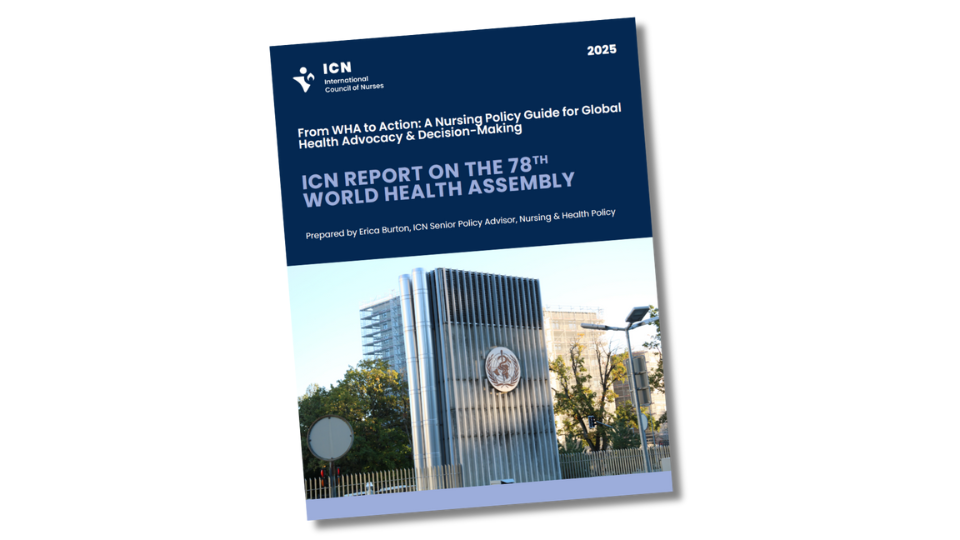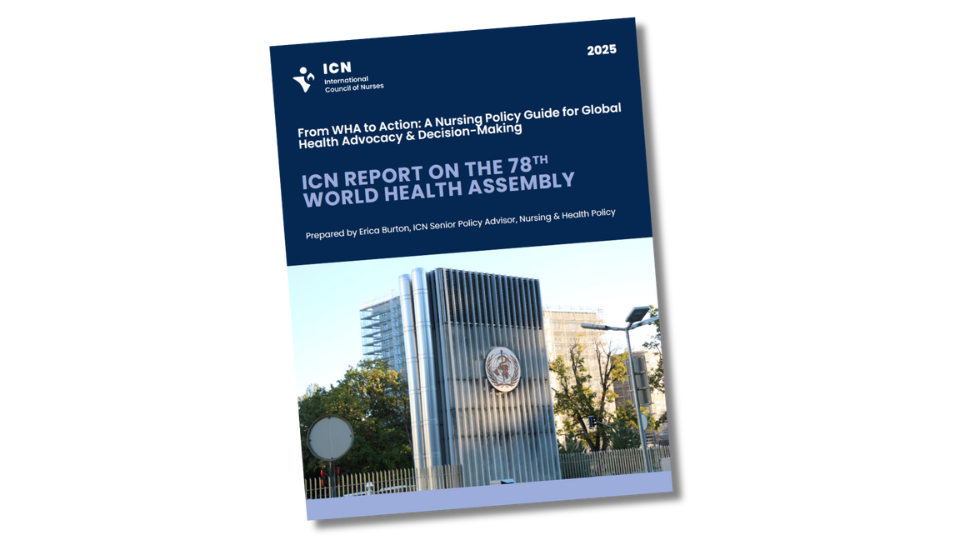ICN's World Health Assembly report underscores impact of nursing leadership in shaping global health policy

The International Council of Nurses (ICN) has released its official report on this year’s World Health Assembly (WHA), highlighting a major moment of nursing impact in 2025 and demonstrating how nurses are essential to every pillar of global health at a time when the world faces major health, economic, and humanitarian challenges.
Nursing leadership driving global health decisions
ICN Chief Executive Officer Howard Catton led ICN’s delegation, joining Member States and partners in Geneva. ICN’s team included Hoi Shan Fokeladeh, Erica Burton and Gillian Moore, welcoming a virtual delegation of more than 100 nurses from around the world, demonstrating the collective global commitment of nurses to policy leadership.
ICN made several interventions at the high-level discussions, addressing urgent priorities including the Global Strategic Directions for Nursing and Midwifery (SDNM); international recruitment and retention of health workers; mental health; universal health coverage through a primary health care approach; and health conditions in conflict zones including Palestine.
“Around the world, we’re off track to meet targets for access to healthcare, vaccines, and non-communicable diseases — and there are huge funding pressures on global health and on WHO itself,” said Howard Catton, ICN CEO. “But amidst these challenges, countries made real progress at WHA: agreeing a new pandemic accord, promoting strategies for health and care workforce resilience building, and extending the global nursing strategy through to 2030. The months since WHA have only highlighted the urgency of these commitments, with accelerating funding pressures and health disparities. These decisions now need to move from words to action — and that means investment. Member States must choose health, and they must choose nursing. As our report makes clear, nursing is absolutely essential to translating these policy commitments into real health improvements and achieving every single one of our global health goals.”
Extending the Global Strategic Directions to 2030
One of the most significant outcomes of WHA 2025 was the extension of WHO’s Global Strategic Directions for Nursing and Midwifery until 2030, strongly advocated for by ICN. Building on evidence from the State of the World’s Nursing 2 (SOWN2) report, which ICN co-chaired, ICN called for governments to extend and commit to implementing the SDNMs, expressing concerns around slow implementation and calling for urgent action to invest in nursing workforces to meet global health demands.
Member state representatives showed strong support for the extension, calling for accelerated action, and recognizing that “nursing leadership is essential to advancing access to health services and achieving universal health coverage.”
International media amplifies central role of nursing in global health
ICN’s message resonated well beyond Geneva. A recent editorial in the British Medical Journal (BMJ) echoed ICN’s advocacy and emphasized the central role of the nursing profession, declaring that there can be “no universal health coverage without nurses.” The BMJ editorial recognizes ICN as worldwide representatives of the nursing profession and draws extensively on the 2025 SOWN report, urging global leaders to “stem workforce shortages and empower the nursing profession”. The authors state: “It is time for immediate and decisive investment in nursing as the path to address our world’s health challenges, achieve our global health goals, and support healthy, thriving populations, everywhere.”
Power of the nursing voice
Throughout WHA 2025, ICN hosted high-level meetings, a nursing leadership luncheon, and virtual dialogues connecting nurse leaders with global policymakers, a testament to the strength of the global nursing community and the reach and impact of the nursing voice in shaping global health policy.
Read the full report, authored by ICN Senior Policy Advisor Erica Burton
